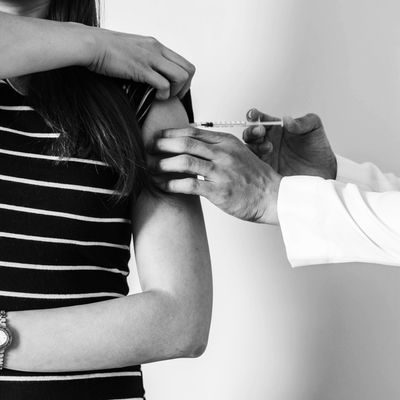
Nearly 20 years after measles was declared eliminated, the potentially deadly infectious disease has made a worrying comeback. In 2019 there have been more than 700 confirmed measles cases spread across 22 states the United States, and more than half of those are in New York City. “If you’re living in New York, it is a little scary,” Paul Offit, a pediatrician and vaccine expert at Children’s Hospital of Philadelphia, told the Cut. Amid the ongoing epidemic, there has been concern over whether certain people — namely, adults who were vaccinated decades ago and are unsure of their vaccination history — should get a booster shot to help protect them against measles. The suggestion prompts the question: Wait, do I need to get a measles booster?
Before late 1989, the start of a major measles outbreak in the U.S., the CDC recommended that children get a single dose of the measles, mumps, and rubella (MMR) vaccine around 1 year of age — a suggestion they changed to two doses, as the epidemic worsened. While one dose of the MMR vaccine is 93 percent effective against measles, two doses is 97 percent effective. Per the U.S. Centers for Disease Control and Prevention website, “people who received two doses of measles vaccine as children, according to the U.S. vaccination schedule, [are] protected for life, and they do not ever need a booster dose.” In other words, if you were born after 1989 — and if your parents followed the CDC recommendation — it’s likely you got two doses.
Furthermore, people who were born before 1957 can assume that they have been naturally exposed to measles and are therefore protected against it, per the CDC website. However, amid this year’s outbreak, some media news outlets have published reports claiming that you may not be protected against measles if you were born between two dates: 1957, which was six years before the first measles vaccine was produced, and 1989, when the CDC changed its recommended doses from one to two.
While not downplaying the seriousness of the outbreaks, Offit says the demographic of people who should be concerned is smaller. “You’ll find that the population at the greatest risk of getting measles was born between 1967 and 1976,” he told the Cut, which is due to two reasons: not many people were getting vaccinated during the time period, and yet the disease was starting to circulate less, so fewer people were exposed to it naturally. But Offit says that even if you were born in this time period, you still only have a one in five chance of not being immune to measles.
Even so, there are no downsides to checking your vaccine history and/or getting a booster, especially if you’re unsure of whether you’re un- or under-vaccinated. Though Offit can see an end to this current outbreak (respiratory viruses peak in specific seasons, and “as you move into May, [measles] will circulate less”), some experts believe this year may be previewing a “new normal,” and that we’ll see similar outbreaks in upcoming years. And, as doctors have had to repeatedly stress this year, there’s only one way to protect yourself against measles.
“Over 90 percent of the measles cases that have occurred in the U.S. [in 2019] have occurred in unvaccinated persons,” Dr. William Schaffner, a professor of preventive medicine and infectious diseases at the Vanderbilt University School of Medicine, told Time. “The emphasis needs to be on getting as many unvaccinated people vaccinated as possible.”




